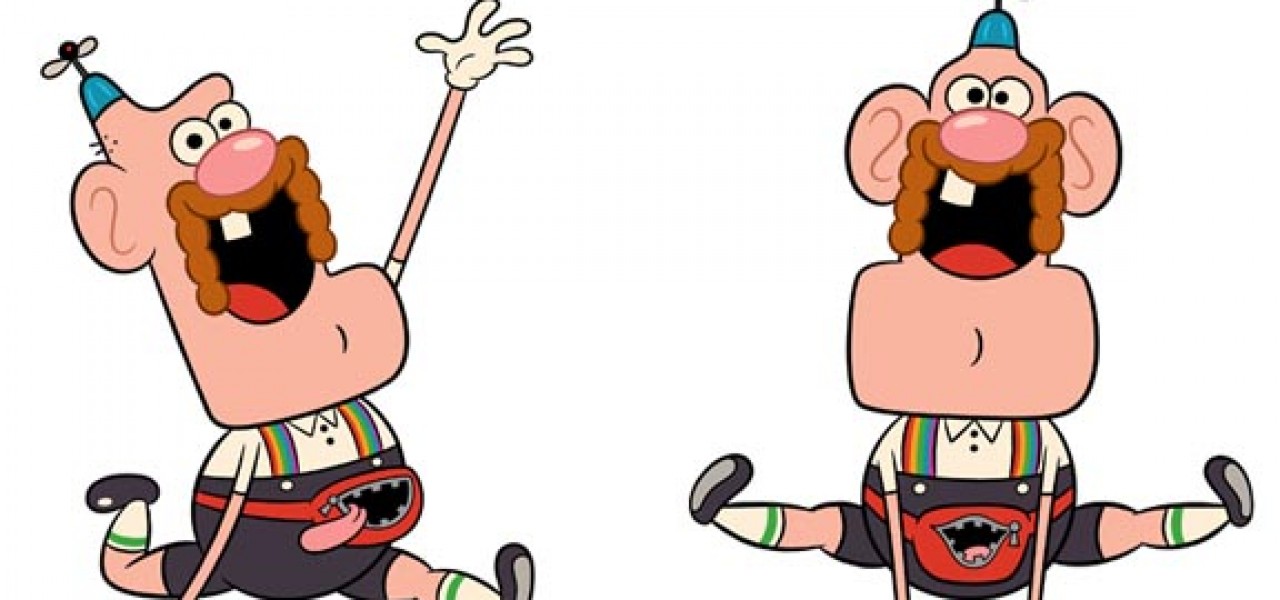
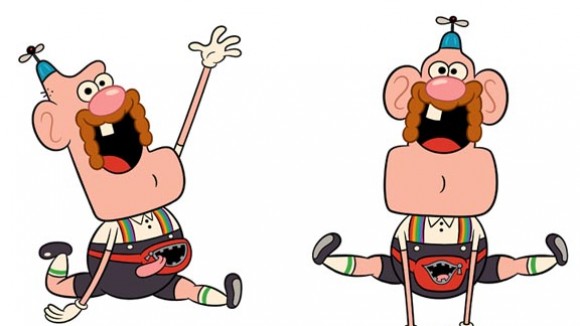
Interview with “Uncle Grandpa” Creator Pete Browngardt
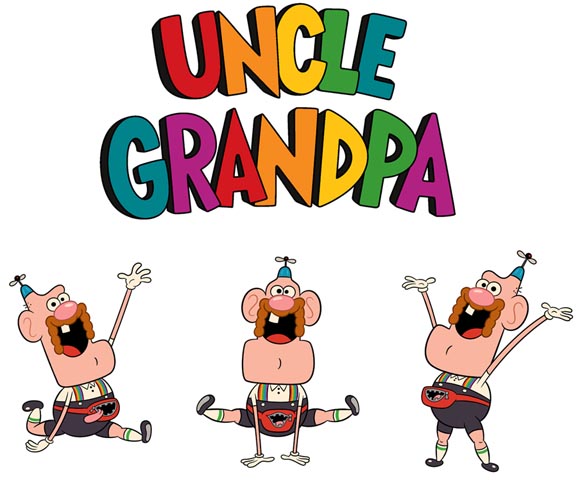
Uncle Grandpa premieres this evening at 8 p.m. (ET, PT) on Cartoon Network. The show was created by Peter Browngardt, 34, who also voices the handlebar-mustachioed star of the show. Uncle Grandpa has been gestating since 2008 when it was part of Cartoon Network’s Cartoonstitute program. The original pilot gained a following online after it was posted on YouTube in 2010, the same year in which the pilot was nominated for an Emmy.
The show revolves around Uncle Grandpa, a fanny pack-adorned, propeller beanie-bedecked gentleman of uncertain origin who travels in a magical RV dispensing ‘Good mornins’ while helping children achieve their dreams. If it sounds like an unconventional setup for a children’s cartoon, the show’s style of humor is even more unique.
Surrealist visual humor, the type of which was practiced by cartooning giants like VIP Partch, Tex Avery, and Don Martin, went out of fashion sometime in the late-Eighties. Uncle Grandpa rejuvenates this strand of comedy with gusto: bodies disassemble and reassemble on command, conceited slices of pizza drive motorbikes, and parallel worlds exist in fanny packs (or belly bags, per the show’s lingo). Browngardt’s new show dispenses with the polite verbal banter of other animated TV series; it is visually vulgar and aesthetically abrasive, and because of its sheer audacity, it’s laugh-out-loud funny.
Cartoon Brew spoke to Browngardt about the show. We accompany the chat with a gallery of production and pre-production artwork from the series.
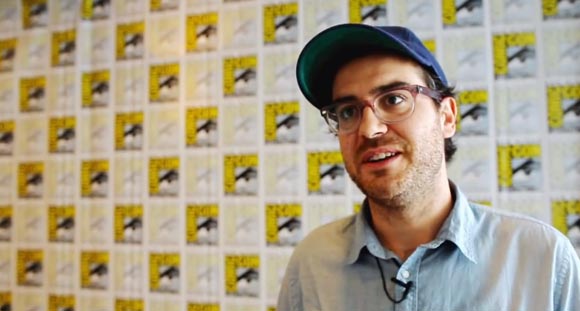
Cartoon Brew: Did you have an Uncle Grandpa-like figure when you were growing up or is it something that you wish you had?
Pete Browngardt: Actually, I think it’s sort of a combination. Growing up, I had uncles, but the funny thing is that neither one of them were actually blood-relatives. They were just my father’s really good friends. I think a lot of people have that, where you just call them Uncle Bob or Uncle Dan or whatever. And these guys were larger-than-life characters. Whenever they came to hang out, it was a nutty time. They let me drive when I was seven years old just to see me drive. We’d build potato cannons and all kinds of stuff that you probably shouldn’t be doing with kids. They were kids at heart as well and they had crazy stories of their life. Like, one of them fought in World War II and hid in a cave, and then got captured and escaped from a POW camp. It was always something adventurous or a good time when they showed up. And then also, I did have a lot of imaginary friends as a kid and I’d go out in the woods and play out scenarios, wishing I could get away.
Cartoon Brew: How many ideas had you pitched before you pitched Uncle Grandpa to Cartoon Network?
Pete Browngardt: It was my first time ever pitching to a studio. A friend, Stephen DeStefano, had a connection to pitch at the studio. I was living in New York at the time. We flew out, and said, ‘Let’s pitch three ideas each.’ I just did quick pitch bible things for three ideas, and pitched to Craig McCracken and Rob Renzetti. Craig and Rob really responded to Uncle Grandpa. And while I was out there, Carl Greenblatt from Chowder had seen my work and he hired me to board on that. I actually moved out to LA to work on that, and through that time period, Cartoonstitute started.
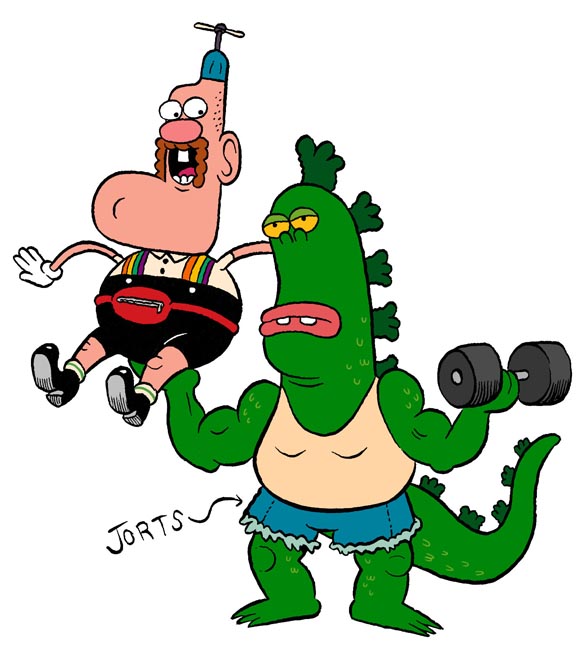
Cartoon Brew: This might be a good moment to talk about your background. I heard you started in animation when you were 19?
Pete Browngardt: I started making animated films when I was seven years old. My older brothers were into making films, they used to make Super 8 horror movies, so I was basically born into a household that liked filmmaking, acting and drawing and all these arts…it was odd to me that other families didn’t do it.
My brothers explained to me at an early age how animation works, and I was like, ‘Wow, you can actually do this.’ My dad and my brother helped me build a lighttable from the back of the Preston Blair animation book, and one of the first things I ever animated was a character swallowing a bee. I animated dog food falling on a dog. I always drew, and I started making animated films all through elementary school. In high school I made stop motion films and some live-action films, and also took a lot of drawing classes.
Got into CalArts and then made films there. After my second year at CalArts, they had that job fair and Producers’ Show, and one of the directors at Futurama saw my second-year film and offered me a job. Basically it was a summer job, and they wanted me to stay, but my parents and myself, I wanted to finish school and get a degree. I ended up going back to school. But yes, when I was 19 I did that. The following summer I got picked for an apprenticeship at Industrial Light and Magic, and I tried doing CG animation which wasn’t a good fit for me. Really missed drawing, but it was a great experience and it was amazing to be in an environment like that. Then, after that I moved back to New York, which is where I’m from, and worked at Augenblick Studios, MTV, World Leaders when they were doing Venture Bros. Then, when I was there, I ended up coming back and pitching to Cartoon Network.

Cartoon Brew: The original Uncle Grandpa pilot was one of the funniest and most original pilots I’d seen. But then you made the series Secret Mountain Fort Awesome, which was based on a gag in the pilot. Was that another one of the pitches? How did it work out that you made a pilot for one thing and got a show for something else.
Pete Browngardt: Well, it was kind of a thing where they weren’t sure about Uncle Grandpa for filling out a whole show. So they asked me to come up with some other things that spun off of it and Secret Mountain was one of those. It was an amazing learning experience for the whole process—of pitching something and then seeing how it can manipulate and change while you’re working on it.
Cartoon Brew: You used a lot of metal and thrash music in Secret Mountain. Can we expect Uncle Grandpa to contain the same?
Pete Browngardt: That music was really for that show. I love that music and when we were doing the animatics for Secret Mountain, I would throw in that music in the temp scores, and it blended really well with the imagery and what I was going for with the design. Now with Uncle Grandpa, there are aspects of that in the music, but we’ve tried to lighten the tone. This new Uncle Grandpa has evolved to be more light-hearted in the sense of a broad kids show, which I’m really excited about. It’s more like Pee-wee’s Playhouse with an expanded cast and expanded world, and I wanted to have more variety in the music and be able to go sort of a happier place, though it does go dark and heavy at times.
We’re actually breaking format on the shows, where within the eleven-minute episodes, we have two stories plus bumpers. We have a seven-to-eight minute story and a two-to-three minute story. Ren and Stimpy used to do that, and even Dexter’s Lab did it, and I really love it because we’re able to experiment. One of the shorts we’re doing is “Uncle Grandpa Sings the Classics,” and it’s Uncle Grandpa singing all the different genres of music. One of them is black metal, and it’s amazing. I was, like, they’re never going to let us put black metal into a kids’ cartoon, but they did.
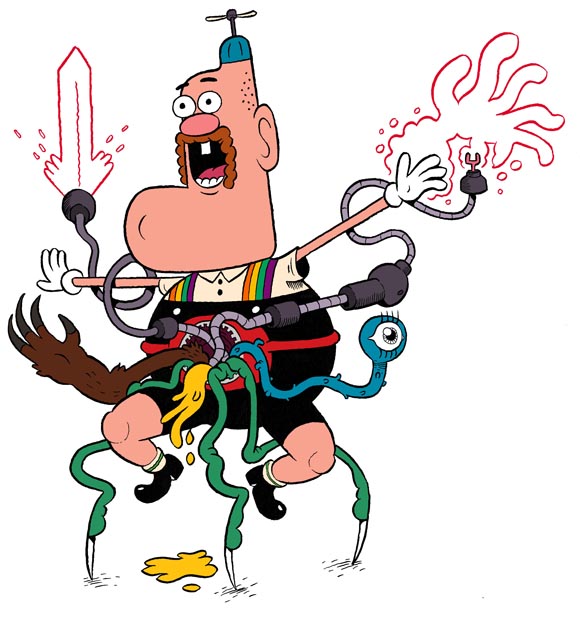
Cartoon Brew: This is one of the few shows Cartoon Network has ever done, if not the only one, where the lead character is over the age of thirty. Usually, the stars of their shows are either kids or teens or in early-20s, but here you’ve got some older dude. I’m curious, within the studio, was that ever a point of contention or awareness that the show was different from everything else they’re doing?
Pete Browngardt: It definitely was talked about. The way I approached writing him, and we all do on the show, is that he may look like an old man but he’s basically a man-child. Once you see what he does, how he acts and talks, you’ll be like, ‘Oh he’s kind of a child.’ It never was a major concern. The [network would] want to veer us towards writing him like a kid because it is a kids’ cartoon and that’s what I wanted to do the whole time so it never was in contention.
Cartoon Brew: It’s funny that you say man-child because I looked at some of the YouTube comments and the most common adjective use d to describe him is ‘retarded.’ That’s not what he is, but that’s kind of another way of saying man-child.
Pete Browngardt: He’s a magical guy who shows up and takes kids on adventures, so we always say he’s like Santa Claus with a GED. And also, there’s this running theme that when he helps kids and stuff, we tell the story in a way where at the end, you don’t know if he’s an idiot or a genius. And I think that busts that whole thinking that he’s just an idiot because you’re wondering, ‘Did he have all this figured out from the beginning or is it all by chance?’
Uncle Grandpa Art Gallery
- Artist: Thaddeus Couldron
- Artist: Nick Edwards
- Artist: Nick Edwards
- Artist: Nick Edwards
- Artist: Nick Edwards
- Artist: Carey Yost
Cartoon Brew: I want to talk a little bit about the visual style of the show. I read MAD when I was a kid, and I see a lot of Don Martin influence in the show. Was that an influence at all, and what are your other visual influences?
Pete Browngardt: Definitely MAD magazine. I had older brothers and they had Seventies and early-Eighties MAD magazines around the house. I used to draw from them constantly when I was a kid. At a certain age, my mom was like, ‘I don’t know if you should be looking at these things,’ so I’d sneak in and check them out. But definitely MAD magazine overall, and Don Martin, and then I got into [Harvey] Kurtzman later when I discovered who he was and how he’s the genius behind the whole thing.
Loved Gary Larson’s Far Side as a kid. Really big influence. I had certain breakthroughs as an artist when I was a kid. Like, MAD was one of them. And then in junior high, the Crumb documentary came out. I’d never heard of R. Crumb and when I saw that and got into his work, he was a huge influence. Garbage Pail Kids was huge with me too, John Pound and all those guys. And then, I got exposed to Tex Avery at a really early age. I had a Screwball Classics VHS that I memorized every cartoon on, and old Warner Bros. too. I would say it’s a blending of all of that stuff. I’m also influenced by contemporaries around me, other artists like Pen [Ward] and Aaron Springer, Carl Greenblatt, lot of people. We all sort of feed off each other.
Cartoon Brew: It’s funny because we have a very similar set of influences because we’re so close in age. When I see your show,, I can understand a lot more where the influences are coming from as opposed to a show created by someone who’s in their mid-to-late 20s. That person will have a completely different set of influences that they’re using, not better or worse, but different.
Pete Browngardt: Absolutely. When I see some of the other creators at the studio and just in animation in general, I’m like, wow. It might not be that huge of a span of years, but it is what you grew up on. I don’t even know if I realized it at the time, but a lot of our crew were all around the same age, and it’s funny because it’s like a second language. You go, ‘Make that look like this or that,’ and everybody knows because we’re all around the same age. We do have some young people starting out, and some people that might be a little older, but especially around the board artists and writers, we’re all around the same age. We all watched the same stuff and we’re influenced by pop culture the same way.

.png)





